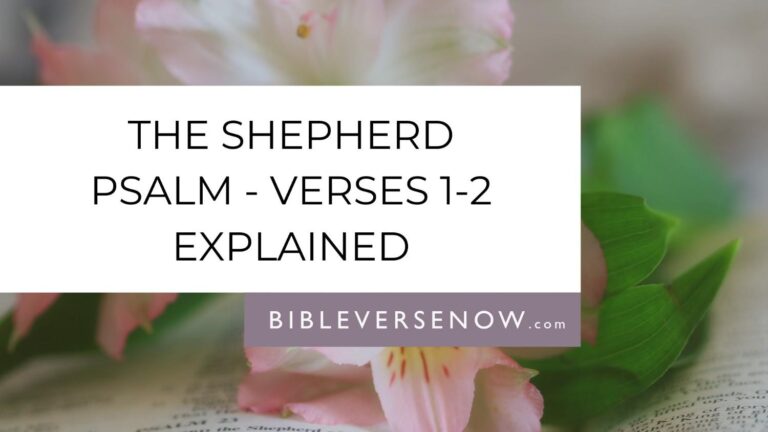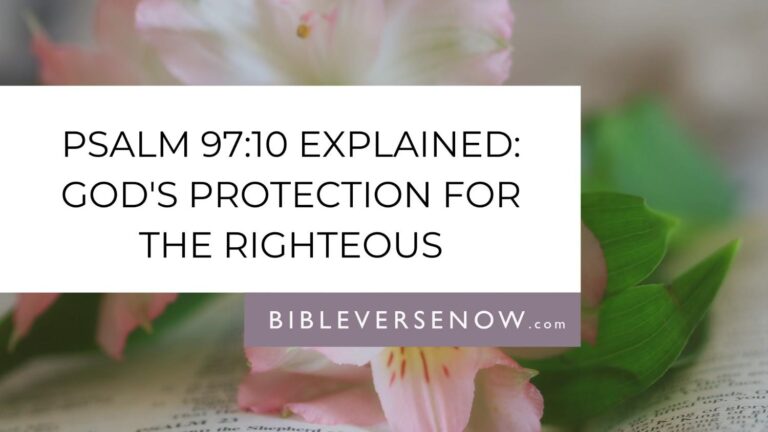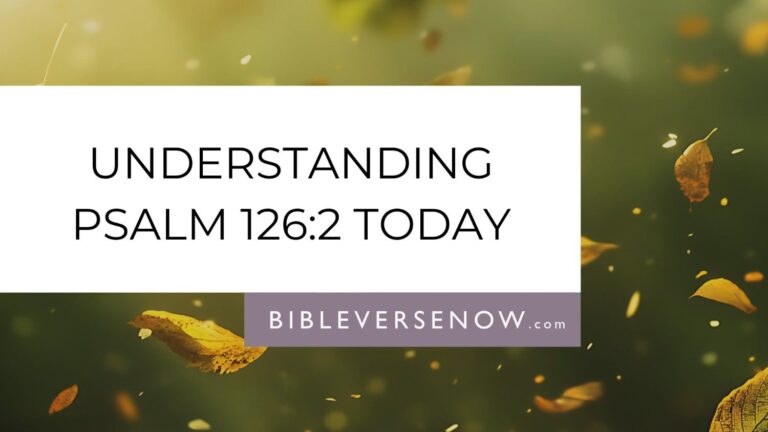Love isn’t just a feeling that comes and goes with the seasons of life. It’s the very heartbeat of God, the foundation of faith, and the thread that weaves through every page of Scripture. When relationships feel strained, when your heart feels empty, or when you’re wondering what real love actually looks like, the Bible offers more than just comfort—it offers transformation.
These verses about love aren’t just beautiful words to read during wedding ceremonies or Valentine’s Day. They’re powerful truths that can reshape how you love God, love others, and even love yourself. Whether you’re seeking healing in a broken relationship, wanting to deepen your understanding of God’s love, or looking for guidance on how to love others well, Scripture provides a roadmap that has guided hearts for thousands of years.
God’s Unconditional Love for You
The foundation of all love begins with understanding how deeply and completely God loves you. His love isn’t based on your performance, your past, or your perfections. It’s steadfast, unchanging, and more powerful than any force in the universe.
Romans 8:38-39 reminds us that nothing can separate us from God’s love: “For I am convinced that neither death nor life, neither angels nor demons, neither the present nor the future, nor any powers, neither height nor depth, nor anything else in all creation, will be able to separate us from the love of God that is in Christ Jesus our Lord.”
This isn’t just poetry—it’s a promise. When you feel unlovable, when shame whispers lies about your worth, when circumstances make you question if God truly cares, this verse stands as an unshakeable truth. God’s love for you is not conditional or temporary.
1 John 4:19 gives us the beautiful reminder: “We love because he first loved us.” Our capacity to love others flows directly from experiencing God’s love for us. You don’t have to manufacture love or try harder to be loving. When you truly grasp how completely you are loved by God, love naturally flows from your heart to others.
Jeremiah 31:3 shows us the eternal nature of God’s love: “The Lord appeared to us in the past, saying: ‘I have loved you with an everlasting love; I have drawn you with unfailing kindness.'” God’s love isn’t something you have to earn or maintain. It existed before you were born and will continue long after your earthly life ends.
The Greatest Commandment About Love
Jesus simplified the entire Christian life into two fundamental commands about love, showing us that love isn’t just one aspect of faith—it’s the central theme.
Matthew 22:37-39 records Jesus’ response when asked about the greatest commandment: “Jesus replied: ‘Love the Lord your God with all your heart and with all your soul and with all your mind.’ This is the first and greatest commandment. And the second is like it: ‘Love your neighbor as yourself.'”
This passage reveals three essential relationships where love must flourish: with God, with others, and with yourself. Loving God with everything you are creates the foundation. Loving your neighbor flows from that foundation. And loving yourself—seeing yourself as God sees you—makes loving others possible.
Mark 12:30-31 emphasizes the totality of this love: “Love the Lord your God with all your heart and with all your soul and with all your mind and with all your strength. The second is this: ‘Love your neighbor as yourself.’ There is no commandment greater than these.”
Notice that loving God involves every part of who you are—heart, soul, mind, and strength. It’s not just emotional or spiritual; it’s comprehensive. This kind of love transforms how you think, feel, choose, and act.
Love in Action and Character
The Bible doesn’t just tell us to love; it shows us what love looks like in practical, everyday life. These verses paint a picture of love that goes far beyond feelings.
1 Corinthians 13:4-7 gives us the most detailed description of love’s character: “Love is patient, love is kind. It does not envy, it does not boast, it is not proud. It does not dishonor others, it is not self-seeking, it is not easily angered, it keeps no record of wrongs. Love does not delight in evil but rejoices with the truth. It always protects, always trusts, always hopes, always perseveres.”
This passage transforms how we understand love. It’s not primarily about emotions or attraction—it’s about character and choice. Love is patient when someone disappoints you. Love is kind when it would be easier to be harsh. Love doesn’t keep score of past hurts but chooses to forgive and move forward.
1 John 3:18 challenges us to make love practical: “Dear children, let us not love with words or speech but with actions and in truth.” Real love shows up. It brings meals when someone is sick, listens when someone needs to talk, forgives when someone has hurt you, and serves without expecting anything in return.
Galatians 5:22-23 shows us that love is a fruit of the Spirit: “But the fruit of the Spirit is love, joy, peace, forbearance, kindness, goodness, faithfulness, gentleness and self-control. Against such things there is no law.” Love heads the list because it’s the source from which all other spiritual fruits flow.
Love for Others and Unity
The Bible consistently calls us beyond loving only those who love us back. True biblical love extends to everyone, even those who are difficult to love.
John 13:34-35 records Jesus’ new commandment: “A new command I give you: Love one another. As I have loved you, so you must love one another. By this everyone will know that you are my disciples, if you love one another.”
The standard for loving others isn’t human love—it’s the love Christ showed us. This means loving sacrificially, unconditionally, and even when it costs us something. Jesus suggests that this kind of love is so distinctive that it becomes the primary way people recognize authentic faith.
Romans 12:9-10 gives practical guidance: “Love must be sincere. Hate what is evil; cling to what is good. Be devoted to one another in love. Honor one another above yourselves.” Sincere love isn’t just about being nice—it involves moral clarity, choosing good over evil, and genuinely caring about others’ wellbeing above your own comfort.
1 Peter 4:8 emphasizes love’s power to heal relationships: “Above all, love each other deeply, because love covers over a multitude of sins.” This doesn’t mean ignoring wrongdoing, but rather choosing to forgive, to see people’s potential rather than just their failures, and to work toward restoration rather than condemnation.
Matthew 5:44 challenges us to love even our enemies: “But I tell you, love your enemies and pray for those who persecute you.” This might be the most difficult command in Scripture, yet it’s also the most transformative. When you can genuinely pray for and seek good for those who have hurt you, you discover a freedom and peace that transcends human understanding.
Love in Marriage and Relationships
The Bible provides specific guidance for how love should function in our closest relationships, offering wisdom that has strengthened marriages and families for generations.
Ephesians 5:33 gives clear direction for married couples: “However, each one of you also must love his wife as he loves himself, and the wife must respect her husband.” This verse emphasizes that love and respect are both essential elements in a healthy marriage relationship.
1 Corinthians 7:3-4 speaks to mutual love and consideration: “The husband should fulfill his marital duty to his wife, and likewise the wife to her husband. The wife does not have authority over her own body but yields it to her husband. In the same way, the husband does not have authority over his own body but yields it to his wife.” This passage emphasizes mutual service and consideration in marriage.
Colossians 3:14 provides guidance for all relationships: “And over all these virtues put on love, which binds them all together in perfect unity.” Love isn’t just one quality among many—it’s the bond that holds all other virtues together and creates genuine unity.
1 John 4:12 reminds us that love makes God’s presence visible: “No one has ever seen God; but if we love one another, God lives in us and his love is made complete in us.” When we love others well, we become windows through which others can see and experience God’s love.
The Ultimate Expression of Love
The cross stands as the ultimate demonstration of what love looks like when it’s willing to sacrifice everything for the beloved.
John 3:16 may be the most well-known verse about God’s love: “For God so loved the world that he gave his one and only Son, that whoever believes in him shall not perish but have eternal life.” This verse reveals the extent of God’s love—He was willing to give His most precious possession to save us.
Romans 5:8 shows us love’s timing: “But God demonstrates his own love for us in this: While we were still sinners, Christ died for us.” God didn’t wait for us to clean up our lives or prove ourselves worthy. He loved us while we were still in rebellion against Him.
1 John 4:10 clarifies the nature of God’s love: “This is love: not that we loved God, but that he loved us and sent his Son as an atoning sacrifice for our sins.” Real love isn’t primarily about our feelings toward God, but about His actions toward us, even when we were undeserving.
John 15:13 defines the greatest kind of love: “Greater love has no one than this: to lay down one’s life for one’s friends.” Jesus didn’t just teach about sacrificial love—He demonstrated it completely.
Love’s Eternal Significance
The Bible teaches that love isn’t just important for this life—it’s the one thing that lasts forever and defines our eternal existence with God.
1 Corinthians 13:13 puts love in eternal perspective: “And now these three remain: faith, hope and love. But the greatest of these is love.” When everything else fades away, when we no longer need faith because we see God face to face, when hope is fulfilled in reality, love will still remain because love is who God is.
1 John 4:8 reveals love as God’s very nature: “Whoever does not love does not know God, because God is love.” This isn’t saying God has love or shows love—it’s saying love is His essential nature. Everything God does flows from His character of love.
1 John 4:16 invites us to live in this love: “And so we know and rely on the love God has for us. God is love. Whoever lives in love lives in God, and God in them.” When you live in love—receiving it, believing it, and expressing it—you’re living in God’s presence and He’s living through you.
Practical Ways to Live These Verses
Understanding these Bible verses about love is just the beginning. The real transformation happens when we put them into practice in our daily lives.
Start each day by remembering God’s love for you. Before you check your phone, before you rush into your responsibilities, take a moment to let the truth of Romans 8:38-39 settle into your heart. You are completely, unconditionally loved.
Practice the love described in 1 Corinthians 13 in small, everyday moments. Be patient when someone is slow in traffic. Be kind when a cashier makes a mistake. Choose not to keep score when someone disappoints you. These small choices to love well create habits that transform your character.
Look for opportunities to love in action, not just words. When someone shares a struggle, ask how you can help rather than just saying you’ll pray for them. When you see a need, meet it if you’re able. When someone needs encouragement, offer specific, genuine praise.
Final Thoughts
These Bible verses about love offer more than just inspiration—they provide a roadmap for the kind of life that brings deep satisfaction and reflects God’s heart. Love isn’t always easy, but it’s always worth it. When you choose to love as God loves, you discover that love doesn’t just change the people around you—it transforms you from the inside out.
God’s love for you is the foundation that makes all other love possible. Rest in that love, believe that love, and let that love flow through you to others. In a world that often feels divided and harsh, your choice to love well becomes a powerful testimony to the reality of God’s presence and character.
Whether you’re facing a difficult relationship, seeking to deepen your marriage, wanting to love your family better, or simply trying to understand what real love looks like, these verses provide wisdom that has guided millions of people throughout history. Let them guide you too, and discover the joy that comes from living a life defined by love.
Frequently Asked Questions
What does the Bible say is the most important thing about love?
According to Jesus in Matthew 22:37-39, the most important aspect of love is that it should be directed first toward God with everything we are, and then toward others as we love ourselves. This creates the foundation for all healthy relationships.
How can I love someone who has hurt me deeply?
The Bible acknowledges this challenge in Matthew 5:44, where Jesus commands us to love our enemies. This doesn’t mean trusting unwisely or ignoring boundaries, but rather choosing to pray for their good and refusing to let bitterness control your heart. God’s love for you provides the strength to extend forgiveness and seek restoration where possible.
What’s the difference between biblical love and worldly love?
Biblical love, as described in 1 Corinthians 13:4-7, is primarily about character and choice rather than feelings or attraction. It’s patient, kind, not self-seeking, and perseveres through difficulties. Worldly love often focuses on what you receive, while biblical love focuses on what you give.
How do I know if I’m truly living in God’s love?
According to 1 John 4:12, when we love others well, God’s love is being perfected in us. The evidence of experiencing God’s love is that it naturally flows out to others through patience, kindness, forgiveness, and sacrificial service.
Can someone who struggles with self-love still love others biblically?
Yes, though understanding your identity as God’s beloved (as described in 1 John 4:19) helps tremendously. Biblical love often grows as you practice it. Sometimes loving others well actually helps you understand your own worth and value in God’s eyes. The command to “love your neighbor as yourself” assumes a healthy understanding of your value as God’s creation.




